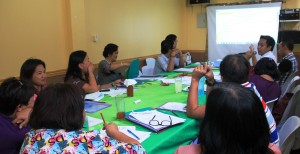
A Program that introduces community-driven development, Kalahi-CIDSS of the DSWD also promotes social safeguards to ensure that its operation will not be detrimental to the people whom it serves, particularly the indigenous peoples of the 11 municipalities where Kalahi-CIDSS is currently implemented.
DSWD Field Office 1 Assistant Regional Director for Operations Marlene Febes D. Peralta, Kalahi-CIDSS Regional Program Coordinator Virginia P. Sesay, Deputy Regional Program Manager Orson Sta.Cruz, Regional Community Development Specialist Johnson Cea, and Community Development Officer Eddie Tumaliuan, Jr. spearheaded the meeting with National Commission on Indigenous Peoples (NCIP) staff headed by NCIP Regional Director Felinor B. Sajonia to discuss Kalahi-CIDSS implementation and arrangements between the DSWD-NCIP Memorandum of Agreement (MOA) at Marand Resort and Spa, Bauang, La Union.
The activity resulted to: the identification of Joint Regional Technical Working Group (JRTWG) members who will be the team to adhere to the engagements of the two departments which shall be firmed up through a special order from the Regional Directors of DSWD and NCIP before August ends; formulation of an action plan on the engagement of NCIP to Kalahi-CIDSS implementation which included NCIP’s commitment to orient Kalahi-CIDSS staff on various laws and provisions in protecting the welfare of Kalahi-CIDSS IP partner beneficiaries, issuance of Certification Precondition (CP); and an agreement to conduct an assessment monitoring to ensure that what have been agreed upon materialize.
NCIP Tagudin Community Service Center Head Agustina Balbino said, “Ngayon na meron na ang MOA, mas malinaw na sa parte namin ang aming roles and interventions sa Kalahi-CIDSS implementation. Ang puno’t dulo naman ng lahat ng ito ay nag-aagree ang ating mga ahensya na siguraduhin ang proteksyon ng mga IPs at ng kanilang kultura at palaging pangingibabawin ang kanilang mga karapatan sa kabuuang proseso ng Kalahi-CIDSS (Now that we have the MOA, our roles and interventions in Kalahi-CIDSS implementation are already clear. The bottomline of this is that both agencies agree to ensure the protection of the IPs and their culture and uphold their rights at all times in the overall processes of Kalahi-CIDSS).”
As it is Kalahi-CIDSS’ principle to empower the communities to identify, decide, implement, and maintain the development which they themselves have driven, the Program also sees the importance that its partner beneficiaries’ culture are protected and that they are free to practice their rights. (by: Jomara S. Chan, Kalahi-CIDSS Social Marketing Officer)

